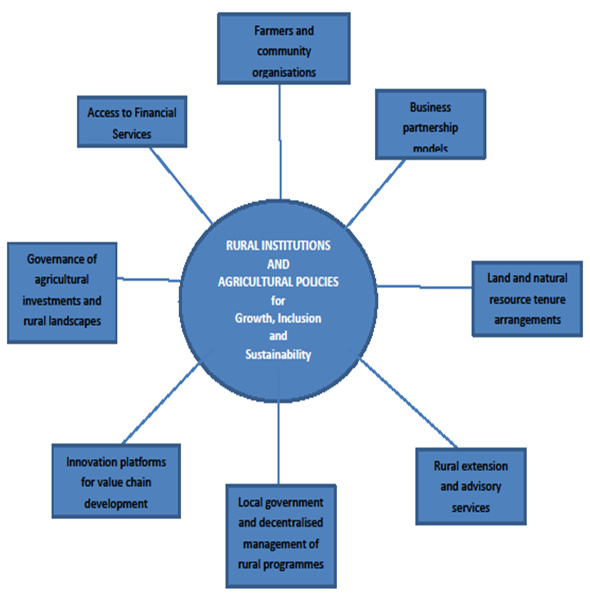What are the key development challenges or opportunities being addressed?
Governments and international agencies are searching for effective institutional frameworks to manage and assist agricultural and rural development to address the challenges of increasing integration of farmers into regional and global markets and value chains, increased public and private investment in agriculture and growing concerns for global food security, rural poverty, regional inequality, and the resilience and climate compatibility of agricultural land use.
The overall challenge is to strengthen the governance of rural development processes so as to guarantee positive impacts and new opportunities for small farmers, rural communities, local economies, and societies and nations as a whole. Desired outcomes are to reduce vulnerability and increase social inclusion, resilience and sustainability of agricultural systems, at a broader scale than presently possible.
There are particular challenges for Africa where the push for agricultural transformation based on adoption of improved technologies and development value chains is often focused on particular sectors, commodities, agribusiness, and more successful producers rather than farmers and rural societies as a whole. There are risks of exclusion of poor and female farmers, capture of benefits by national and international elite interests and of limited scalability of innovation, if the social and institutional dimensions of technical and economic change are neglected.
There is increasing awareness of the importance of broader stakeholder involvement in agricultural innovation, and establishment of coordinated networks of actors to address specific challenges in different locations and regions to deliver the necessary services, skills, information, communication and capacity building and establish effective public policies to stimulate more productive, profitable and sustainable farming.
New institutional arrangements and partnerships linking farmers' organisations, with the private sector and government are required to strengthen land and natural resource governance and improve delivery of information, technical advisory and development support to assist farming families, rural communities and regions to prosper sustainably.
Specific challenges include:
- Strengthening and developing farmers' and community-based organisations to become more representative and to work effectively in partnership with others.
- Strengthening land tenure rights and reducing land conflicts without excluding small farmers from new economic opportunities.
- Design of inclusive, sustainable business models and partnership arrangements for small farmer participation in agribusiness and value chain development.
- Appropriate institutional frameworks to improve coordination and delivery of effective rural advisory, information and financial services to achieve sustainable agricultural intensification and better market access.
- Develop inclusive sustainable multi-functional agriculture and land use mosaics that meet multiple societal needs and are climate compatible
- Strategies to strengthen and sustain the capacity of local service providers to support farmers, farmer organisations and rural communities
- Stronger all round governance and delivery arrangements for rural development processes to ensure positive impacts of agricultural investment on local economies.
Who will benefit?
- Small-scale farmers, pastoralists and farming communities in partner countries: the programme will apply social and economic knowledge and interdisciplinary analysis to practical engagement in efforts to improve institutional arrangements and policy development in a group of African countries where NRI is active, so as to help in establishing and delivering inclusive development strategies, rural support services and better market and natural resource governance.
- Government and voluntary agencies, farmers' organisations, developing country educational institutions, private sector partners and other value chain actors will benefit from practical engagement with applied research and development projects focused on innovation and partnership development, providing access to tools and methods and opportunities for institutional conditions which lead to innovation for sustainable and inclusive transformation of agriculture and of rural areas. This will be based on participatory interdisciplinary research into development dynamics, drivers and institutional constraints.
- To identify, develop and test institutional innovations for community- investor partnerships in agricultural development, securing land and natural resource tenure, development of farmer organisations, and effective delivery of advisory and financial services in specific regions and areas of African and other countries.
- To build practical collaborative frameworks, stakeholder platforms and coalitions for the governance of sustainable and inclusive agricultural development, achieving effective linkages between local, regional, national and global scales.
- To improve the delivery and social and geographical reach, scale and impact of rural development support programmes and services in African countries.




